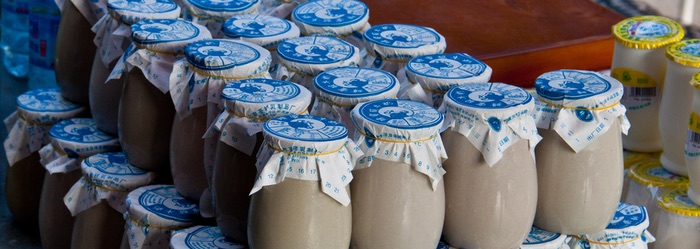
Podcast: Play in new window | Download (Duration: 23:56 — 22.0MB)
Subscribe: Google Podcasts | Spotify | Android | RSS | More

All this and more I learned from Yoghurt: A Global History, a recent book by June Hersh. What I still don’t know is why those Neolithic people were even trying to drink milk, if it upset their stomachs. They were keeping sheep and goats, sure, but why were they milking them?
Notes
- Yoghurt: A Global History is available from Reaktion Books, and for a discount enter Yoghurt21 at checkout.
- Metchnikoff is a pretty fascinating character quite apart from his role in the rise of yoghurt. His Nobel biography is an interesting starting place, which naturally leads to a book extract about his public lecture.
- It really is very easy to make your own yoghurt at home, though not as easy as kefir.
- Here is the transcript
- Banner photo from Nikolaj Potanin on Flickr.
.

[…] Jeremy’s duet with June Hersh on yoghurt. […]
Why were they even trying to drink milk if it upset their stomachs? That’s not a great mystery. In the parts of the Near East and Central Asia where people first domesticated goats/sheep/cattle, the animals’ reproductive schedules were nothing like the year-round system we have today. They gave birth and came into milk as the weather was warming up. When they reached peak production, local daytime temperatures could easily reach more than 100 degrees F (40-plus C) and milk could go sour within a few hours of milking. So the precursors of yogurt could have almost invented themselves.
Thank you Anne. Doesn’t that pre-suppose that one reason people domesticated sheep, goats and cattle was in order to milk them, rather than to have a source of meat that did not require hunting. I think that’s the unspoken part of my question. Why were people milking those first domesticated animals?
Animal domestication for meat came first. I discuss the issue at length in a book about the history of milk leading up to today’s gigantic industry, to be published in the US (probably in about a year) by Columbia University Press.
as a Yoghurt Fan who recently started making my own for the first time I’m looking forward to listening to this ep
[…] a pot of ancient maize. Toast to a new museum of food in the UK. Jeremy’s duet with June Hersh on yoghurt. Scientific American epic on the European Neolithic. Rhapsody on saving wheat from climate change. […]
Latest episode talking to June Hersh about Yoghurt: A Global History from @reaktionbooks
How the modern era started in June 1904 and why growth is particularly rapid in China.
eatthispodcast.com/yoghurt.mp3/
Latest episode talking to June Hersh about Yoghurt: A Global History from @reaktionbooks
How the modern era started in June 1904 and why growth is particularly rapid in China.
eatthispodcast.com/yoghurt.mp3/
Feed your microbes well @jfcryan @Pharmabiotic @Irishfoodcultur
Latest episode talking to June Hersh about Yoghurt: A Global History from @reaktionbooks
How the modern era started in June 1904 and why growth is particularly rapid in China.
eatthispodcast.com/yoghurt.mp3/
Latest episode talking to June Hersh about Yoghurt: A Global History from @reaktionbooks
How the modern era started in June 1904 and why growth is particularly rapid in China.
eatthispodcast.com/yoghurt.mp3/
Ten thousand years of yoghurt – Eat This Podcast
eatthispodcast.com/yoghurt-mp3/
Ten thousand years of yoghurt @EatPodcast “The story is that way back when, Neolithic people discovered they could eat milk that had gone sour with impunity, even though ordinary milk upset their digestion….” but why drink milk in the first place? eatthispodcast.com/yoghurt/